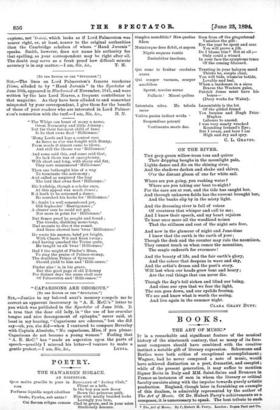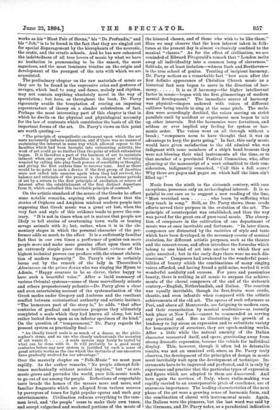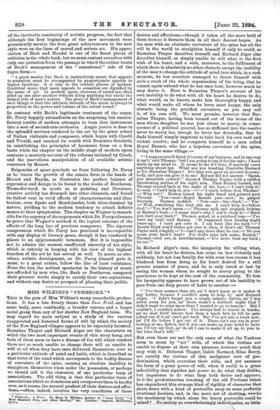BOOKS.
THE ART OF MUSIC.* IT is a remarkable and significant feature of the musical history of the nineteenth century, that so many of its fore- most composers should have combined with the creative' instinct a notable gift of literary expression. Schumann and Berlioz were both critics of exceptional accomplishment ; Wagner, had he never composed a note of music, would have achieved distinction as a poet, dramatist, and essayist; while of the present generation, it may suffice to mention Signor Beito in Italy and MM. Saint-Saens and Brunean in France as instances of men in whom the literary or critical faculty coexists along with the impulse towards purely artistic production. England, though later in furnishing an example- of this dualism, is admirably represented by the author of The Art of Music. Of Dr. Hubert Parry's achievements as a. composer, it is unnecessary to speak. The best tribute to such.
• Tho_Art of Music, By C. Hubert H. Parry. London: Kew& Paul and Co.
works as his "Blest Pair of Sirens," his "De Profundis," and his "Job," is to be found in the fact that they are singled out for special disparagement by the hierophants of the neurotic, the erotic, and the erratic schools. And he has now enhanced the indebtedness of all true lovers of music by what we have no hesitation in pronouncing to be the sanest, the most sagacious, and the most luminous treatise on the origin and development of the youngest of the arts with which we are acquainted.
The preliminary chapter on the raw materials of music as they are to be found in the expressive cries and gestures of savages, which lead to song and dance, melody and rhythm, may not contain anything absolutely novel in the way of speculation ; but here, as throughout the book, Dr. Parry rigorously avoids the temptation of rearing an imposing superstructure of theory on a slender substratum of fact.
Perhaps the most interesting part of this chapter is that in which he dwells on the physical and physiological necessity for the law of contrasts which constitutes the basis of all the important forms of the art. Dr. Parry's views on this point are worth quoting :—
" The principle of sympathetic excitement upon which the art rests necessarily induces exhaustion, and if there was no means of sustaining the interest in some way which allowed repose to the faculties which had been brought into exhausting activity, the work of art could go no further than the point at which exhaustion began. It is therefore a part of the business of art to maintain interest when one group of faculties is in danger of becoming wearied by calling into play fresh powers of sensibility or thought, and giving the first centres time to recover tone. And as there would be no point in such a device if the first group of faculties were not called into exercise again when they had revived, the balance and rationale of the process is shown in mature periods of art by a return to the first principle of excitation or source of interest after the establishment of the first distinct departure from it, which embodied this inevitable principle of contrast."
On the artistic standard of the music of the Greeks he offers some notable remarks, arguing with great force that the stories of Orpheus and Amphion mislead modern people into
supposing that Greek music was a great art lost, when the very fact and style of this evidence tends to prove the con- trary. "It is not in times when art is mature that people are likely to tell stories of overturning town walls or taming savage animals with it; but, rather, when it is in the ele- mentary stages in which the personal character of the per- former adds so much to the effect. It is a sufficiently familiar fact that in our own times a performer of genius can move people more and make more genuine effect upon them with an extremely simple piece than a brilliant virtuoso of the highest technical powers can produce with the utmost elabora- tion of modern ingenuity." Dr. Parry's view is certainly borne out by the remark of the lady in Theocritus's Adoniazusw on the prima donna who was singing the Hymn to Adonis, "Happy creature to be so clever, thrice happy to have such a beautiful voice." After a lucid summary of various Oriental systems—some of them marvellously minute and others preposterously pedantic—Dr. Parry gives a clear and even entertaining account of the systematisation of the Greek modes under Gregory and Ambrose and the resultant conflict between ecclesiastical authority and artistic instinct. "The humorous part of the story is," he adds, "that after centuries of gradual and cautious progress they ultimately completed a scale which they had known all along, but had rather looked down upon as an inferior specimen of its kind." On the question of "temperament," Dr. Parry regards the present system as practically final :— "An ideally tuned scale is as much of a dream as the philo- sopher's stone, and no one who clearly understands the meaning of art wants it A scale system may fairly be tested by what can be done with it. It will probably be a good many centuries before any new system is justified by such a mass of great artistic works as the one which the instincts of our ancestors have gradually evolved for our advantage."
Over the masterly chapter on " Folk-Music " we must pass rapidly. As the author remarks, "No people attempt folk- tunes mechanically without musical impulse," but "as art- music grows and pervades the world, pure folk-music tends to go out of use among the people. Reflections of respectable taste invade the homes of the masses more and more, and familiar fragments which are adopted from various sources by purveyors of tunes for light popular operas and such gay entertainments. Civilisation reduces everything to the com- mon level, and 'the people' cease to make their own tunes, and accept vulgarised and weakened portions of the music of the leisured classes, and of those who wish to be like them.''' Here we may observe that the keen interest taken in folk- tunes at the present day is almost exclusively confined to the musical "classes." As for the effect of civilisation, we are reminded of Edward Fitzgerald's remark that "London melts away all individuality into a common lump of cleverness." Solitude, or at least isolation—witness Bach and Beethoven— is the true school of genius. Treating of incipient harmony, Dr. Parry notices as a remarkable fact "how soon after the first definite appearance of Christian Church music as a historical fact men began to move in the direction of har- mony It is as if harmony—the higher intellectual factor in music—began with the first glimmerings of modern mental development." The immediate source of harmony - was physical—singers endowed with voices of different calibres being unable to sing at the same pitch. The melo- dies were accordingly doubled, the voices moving on strict parallels until by accident or experiment men began to mix up other intervals. But the harmonies were fortuitous, and seldom or ever implied any feeling for system or har- monic order. The voices went on all through without a break ; "composers seem to have thought that it was an advantage to keep the parts going." In fact, this early music would have given satisfaction to the old admiral who was indignant with some members of a ship's band because they were not blowing their wind instruments all the time, or to that member of a provincial Festival Committee, who, after glancing at the manuscript of a work submitted to their con- sideration, indignantly remarked, "Call this a full score ? Why there are pages and pages on which half the lines ain't filled up ! "
Music from the ninth to the sixteenth century, with rare exceptions, possesses only an archwological interest. It is so painful to our ears as to suggest a new reading of the line, "Most wretched men who learn by suffering what they teach in song." Still, as Dr. Parry shows, these crude efforts served their purpose in the evolution of the art. The principle of counterpoint was established, and thus the way was paved for the great era of pure vocal music. The absorp- tion of composers in the cultivation of one department of music was at once inevitable and fortunate. "In later times, composers are distracted by the varieties of style and taste which have been developed, in the necessary course of musical evolution, for different artistic purposes, such as the theatre and the concert-room, and often introduce the formulas which belong to one kind of art into another to which they are quite unsuited ; but in the early days there were no such dis- tractions." Composers had awakened to the wonderful possi- bilities of beauty which the combinations of many singing voices afforded, and having found a gold-mine, worked it with wonderful assiduity and success. For pure and passionless beauty, there is nothing in all music to surpass the achieve- ments of the choral composers of the end of the sixteenth century,—English, Netherlandish, and Italian. The reaction was equally inevitable, though its first-fruits were crude, chaotic, and even infantile when compared with the artistic achievements of the old art. The operas of such reformers as Pen, and above all Monteverde, are fatiguing to modern ears, and their resuscitation by musical academies—as recently took place at New York—cannot be commended as serving any practical end. But as illustrating the growth of a tendency to lay stress on expression and to substitute variety for homogeneity of structure, they are epoch-making works. After a little while the natural amenity of the Italian character reasserted itself, and opera, gravitating away from strong dramatic expression, became the vehicle for individual display. This, however, though it often led to detestable results, was not an unmixed evil, since, as Dr. Parry truly observes, the development of the principles of design in music must inevitably wait upon the development of technique. In- struments have to be improved and perfected, and it is only by experience and practice that the particular types of expression ' and figure which are adapted to them are discovered. And here again the services of Italy, where violin-making was rapidly carried to an unsurpassable pitch of excellence, are of enormous importance. The leading characteristics of the next phase of the art were a growing sense of harmonic form, and the combination of choral with instrumental music. Again, the Italians were the pioneers, but the last word was said by the Germans, and Dr. Parry notes, as a paradoxical indication of the inevitable continuity of artistic progress, the fact that although the first beginnings of the new movement were prominently secular, the first great achievements in the new style were on the lines of sacred and serious art. His appre- ciation of Bach and Handel is one of the finest pieces of criticism in the whole book, but we must content ourselves with only one quotation from the passage in which the author treats of Bach's management of the " sensational " side of the fugue form :—
" A. great master like Bach is instinctively aware that appeals to sensation must be accompanied by proportionate appeals to higher faculties. It is only in the crudest phases of modern theatrical music that mere appeals to sensation are dignified by the name of art. In modern opera, climaxes of sound are often piled up one after another without doing anything but excite the animal side of man's nature. The glory of Bach's management of such things is that the intrinsic interest of the music is always in proportion to the power and volume of the actual sound."
In contrast with Bach's legitimate treatment of the organ, Dr. Parry happily animadverts on the surprising but unsatis- factory results of modern attempts to turn that instrument into a sort of second-rate orchestra. Ample justice is done to the splendid services rendered to the art by the great school of Italian violinists and composers, which began with Corelli and Vivaldi, and reached its zenith with Dominic° Scarlatti, in establishing the principles of harmonic form on a firm basis, while the chapter on the middle stage of modern opera contains a masterly account of the reforms initiated by Gluck, and the marvellous manipulation of all available artistic resources by Mozart.
Exigencies of space preclude us from following Dr. Parry as he traces the growth of the sonata form in the hands of Mozart and Haydn, or illustrates the perfect balance of expression and design to be found in the works of Beethoven. Thencefor ward, in music as in painting and literature, creative activity has diverged into other channels, and found its fullest vent in vivid effects of characterisation and illus- tration, even Spohr and Mendelssohn, both ultra-classical by nature, yielding to the modern tendency to attach definite names to their symphonies. The chapter on Wagner is remark- able for the cogency of the arguments which Dr. Parry advances to prove that Wagner's method is the logical outcome of the efforts of the long line of previous composers. The rigorous compression which Dr. Pally has practised is incompatible with any display of literary grace, though it has conduced in places to an epigrammatic terseness. But it is impossible not to admire the earnest, unaffected sincerity of his style, which is entirely in keeping with his view of the highest function of the art he has served so well. In music as else- where, artistic development, as Dr. Parry himself puts it, must, to a great extent, follow the line of least resistance. None the less, the noblest spectacles in the history of music are afforded by men who, like Bach or Beethoven, composed their greatest works simply to satisfy their own aspirations, and without any desire or prospect of pleasing their public.




































 Previous page
Previous page